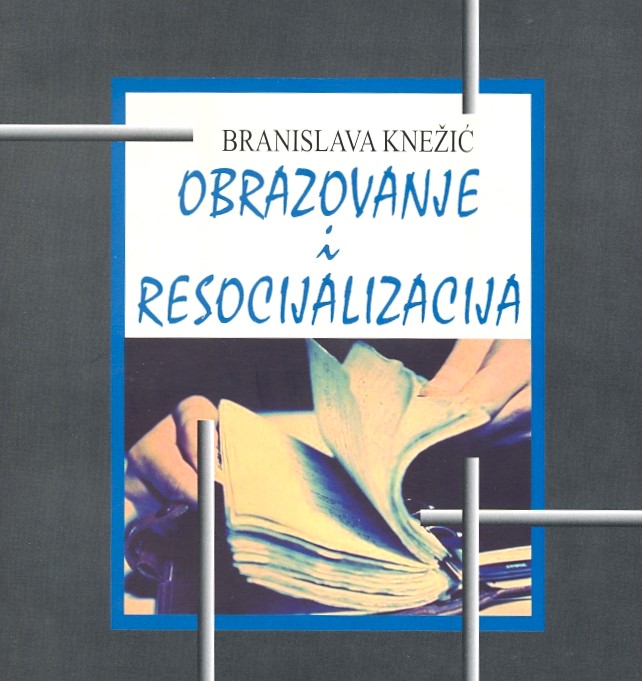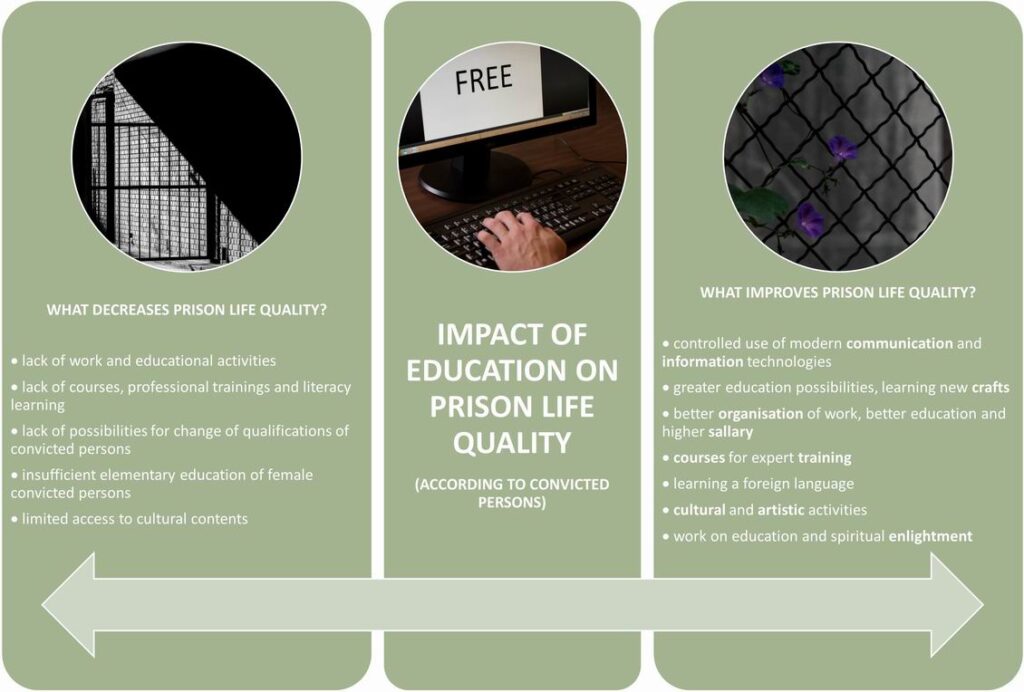Negative consequences of imprisonment and ways to overcome them
My first student visit to a correctional institution made me ask myself the question that keeps pursuing me even nowadays: How can we change and humanize the dwelling of those who are “expelled from life” and placed inside locked buildings, surrounded by walls and bars? Coercive and repressive measures are not sufficient since they can neither preserve the dignity of a human being nor reduce criminality.
Although the negative consequences of the deprivation of liberty were noted as soon as the first prisons were established, the trust in the re-socialisation of offenders still represents a challenge for those who imprisoned them. Imprisonment includes a constant exposure of the convicted person to the situations full of coercion, pressure, fear, intolerance, frustrations and deprivations, accompanied by various personal crisis and negative reactions. Prison regime and the status of a convicted person clearly do not represent the oases of kindness, cooperativeness, warm words and safety. Still, such conditions do not exclude the application of measures that differ from intimidation, solitary confinement and strokes that hurt body and soul.
Learning, training and various educational programmes seem to be good signs on that road. The changes of convicted persons’ behaviour represent a great challenge for all those dealing with the issue of prison sentences in practice and science, and educational activities should justify the expectations of the community. Any kind of education can improve the quality of life behind bars, apart from providing the hope for life without recidivism.

Photography: Ana Batrićević
Education of convicted persons as an international standard
How to spend time in prison in a meaningful way is the concern of both – prison staff as well as convicted persons. Education is a beneficial activity that is not applied frequently enough. Together with labour and leisure activities, education should prepare the convicted person for life outside the prison walls and mitigate the consequences of prison life.
The importance of education as a part of treatment in prisons has been recognised by international organisations that keep highlighting the fact that education is one of essential human needs and one of fundamental human rights of crucial significance for personal development. If the Law on the Enforcement of Criminal Sanctions is compared with international standards, especially with European Prison Rules, one can conclude that current normative framework is comprehensive enough to regulate the organisation of education, labour and leisure activities of convicted persons. However new/old legislative solutions are condemned to failure if legal provisions do not become a part of daily life in correctional institutions.
If a convicted person is not given the opportunity to participate in formal means of education and training, a space is left for “prison learning”, i.e., negative mutual impacts of convicted persons and experienced “mentors” from groups of prisoners.

Photography: Cover page of book „Education and re-socialization: methods of measuring“ by prof. Branislava Knežić, PhD, published in Belgrade in 2001 by Institute for Textbooks and Educational Resources
What is the purpose of convicted persons’ education?
By defining the purpose of prison sentence in Paragraph 43 of the Law on the Enforcement of Criminal Sanctions, the legislator actually regulates the substantial issues of education and learning of convicted persons:
- the change of behaviour and attitude towards criminality
- the preparation for the occupations that will be demanded on the labour market
- providing convicted persons with the knowledge that will facilitate their social re-integration and life as free citizens.
If one could fulfill the purpose of prison sentence, he/she would also be able to answer the following question: What is the purpose of convicted persons’ education? The following reasons could be taken into consideration when answering that question.
Learning and education:
- are becoming inevitable in contemporary life, even in correctional institutions
- facilitate the adjustment to the conditions inside the correctional institution and the preservation of physical and mental health of convicted persons
- allow the suppression of illiteracy and provide a second chance through functional elementary education of adults
- ease professional education (additional training, learning different skills and training)
- strengthen the protection from “criminal infections” and teach convicted persons how to avoid violent and aggressive behaviour
- encourage the resolving of various family problems and enhance responsible parenthood
- improve communication and other social skills necessary for citizens’ participation
- have the potential to reduce unemployment and recidivism
- can contribute to the increase of social inclusion
The challenges related to the education of convicted persons
The challenges related to the education of convicted persons begin with the fact that they are incarcerated by force and, consequently, can hardly recognise any positive aspects of penal institutions. These temptations come from the characteristics of the persons deprived of liberty (age, gender, previous education level and learning difficulties, motivation for learning, previous employment etc.) as well as from the issues related to the society and prisons (the capacity to organise education, the professional skills and motivation of prison employees, security concerns, cooperation with the civil sector etc.).
The selection and the number of convicted persons that can be included in the educational programmes is limited by financial, spatial and professional capacities of penal institutions and by the number of these programmes. The suitability of these programmes, the readiness of the employees to implement them and the motivation and the capabilities of the convicted persons are the preconditions for successful application of education as a part of treatment. The organisation of education in accordance with the needs of the convicted persons and of the broader community would enable the society to observe its responsibility for convicted persons from a different perspective.

Graph showing a part of the results of qualitative segment of research conducted within PrisonLIFE Project that refers to the opinion of the convicted persons about the factors related to education that contribute to the improvement or decrease in the quality of prison life. Photography: Ana Batrićević
Change as the purpose of educational process
If we assume that the purpose of education is the adoption of knowledges, skills and habits with the aim to change a certain dimension of individual’s personality, we can conclude that such change is even more necessary in the case of convicted persons. Tackling the issue of the necessity of education represents the confrontation with its fundamental ontological and axiological grounds. The answers to this question are related to the essence of human nature or humanisation. In that sense, it can be said that both – common reason and philosophical thought “entrust” the process of education to humans.
We are not in deception that ignorance is the only reason why individuals commit criminal offences and that gaining knowledge and skills without ethical values and social changes could prevent recidivism. Nevertheless, we are also aware that there is no doubt about the usefulness and importance of education in penological andragogy. Regardless of the nature of the link between education and re-socialisation of convicted persons, it is clear that they are not excluding one another but that they are intertwined in the attempt to preserve human dignity.
Professor Branislava Knežić, PhD
